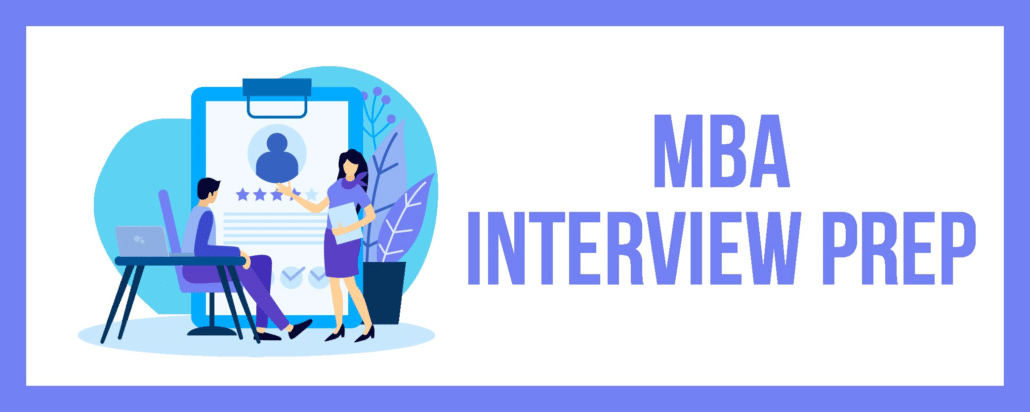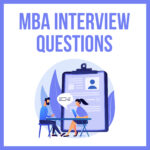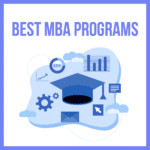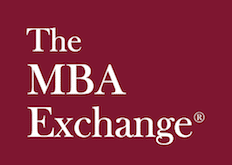
Stepping onto the pathway of a top MBA program is like embarking on a grand adventure into the business world. One of your first steps is to prepare for your business school interview.
In this comprehensive guide, we will navigate through the labyrinth of MBA interview prep: how to prepare for an MBA interview. We’ll review the types of interviews you might encounter with a school or program, how to prepare for frequently asked questions, and other tips.
Buckle up because we’re about to embark on a thrilling ride!
Types of MBA Interviews
In the grand scheme of MBA interview prep, understanding the types of interviews you may encounter can give you a significant advantage. Every business school has a unique interviewing style, usually based on their values, culture, and preferences.
Here’s a deep dive into the various formats you might run into.
Blind Interviews

In a blind interview, the interviewer has access only to your resume and perhaps your cover letter. They have yet to review your entire application. This type of interview is common in many schools, including Harvard Business School.
The advantage of a blind interview is that you can guide the narrative and emphasize the points you believe are most important. However, it requires you to effectively summarize your academic and professional experience without relying on the interviewer’s familiarity with your application.
Comprehensive Interviews
Comprehensive interviews are the opposite of blind interviews. In this format, the interviewer has reviewed your entire application, including your essays, letters of recommendation, and transcripts. As a result, they have a holistic view of your profile and can ask detailed questions about any aspect of your application.
This type of interview requires you to be prepared to discuss any part of your application in-depth and provide further insights beyond what is written in your application.
Alumni Interviews
Graduates of the MBA program conduct alumni interviews. While they may not be currently involved with the school, they have first-hand experience of being a student and can provide valuable insights. In addition, they are often interested in assessing whether you would be a good fit for the school’s culture and community.
Admissions Committee Interviews
In this type of interview, a member of the admissions committee interviews you. These individuals are experienced interviewers who play a crucial role in the decision-making process. It’s important to note that they deeply understand the school’s requirements and expectations.
Student Interviews
Some schools, such as Tuck School of Business, use current students as interviewers. These interviews can be less formal and more conversational. However, it’s important to maintain a professional demeanor, as student interviewers’ feedback plays a role in the admission process.
Team-Based Discussion
A unique format adopted by schools like Wharton is team-based discussion. In this format, a group of applicants discusses a topic or works on a problem together while being observed by admissions staff. This method assesses your team skills, leadership style, and problem-solving abilities in a team setting. This Wharton MBA environment is different than many other schools.
Virtual Interviews
With the advent of technology, and especially in the wake of the recent pandemic, virtual interviews have gained popularity. They allow the school and the candidate to connect from different geographic locations. However, despite the virtual setting, they should be treated with the same level of seriousness and preparation as an in-person interview.
Understanding these different types of MBA interviews can help you tailor your preparation accordingly and confidently navigate your interview process. Remember, no matter the interview type, the core principles remain the same: be yourself, be prepared, and convey your passion for attending the school or online MBA program.
Self-Reflection: Preparing for MBA Interview Questions
Know Thyself
The first step in your MBA interview prep should be introspection. Identify your strengths, weaknesses, achievements, and failures. This self-awareness will help you prepare answers that reflect your personality and professional accomplishments. To do this effectively, set aside some quiet time and think about the following aspects:
- Personal and professional experiences
- Strengths and weaknesses
- Leadership style and examples
- Unique Selling Points (USPs)
Research: Knowledge is Power
Get the Inside Scoop
Thorough research about your prospective school or program is essential. Dig deep into the school’s curriculum, culture, clubs, opportunities, and even the average GMAT score of admitted students. This prior research will show your genuine interest in the school and help you tailor your answers to align with the school’s values. To conduct effective research, consider these approaches:
- Visit the school’s website: Explore the program’s web pages, marketing materials, and news sections to learn about its academic offerings, resources, and recent accomplishments.
- Attend information sessions and webinars: Many business schools offer information sessions and webinars where you can learn more about the program and ask questions.
- Connect with current students and alumni: Reach out to current students and alumni to gain insider perspectives about the program, student life, and post-MBA career opportunities.
- Read student blogs and forums: Student blogs and online forums can offer valuable insights about the school, its culture, and what to expect during the MBA interview process.
- Follow the school on social media: Stay updated with the latest news and events by following the school’s official social media channels.
Integrating Your Research
Once you’ve gathered all this information, integrate it into your interview responses. You’ll make a lasting impression on the admissions committee by demonstrating your deep understanding of the school’s offerings and how they align with your career goals and values.
Practice: The Secret to Success
Effective practice involves more than simply rehearsing your answers. It’s about improving your delivery, learning to think on your feet, and ensuring that your responses align with the values of the business school. Here are a few techniques to consider:
- Role-play: Ask a friend, family member, or a professional coach to role-play the interview with you. This can give you a sense of what the actual interview will feel like.
- Record and review: Record your practice sessions and review them. This can help you spot any verbal tics or body language issues you might need to work on.
- Time your responses: MBA interviews often involve a lot of questions in a relatively short time. You can ensure that you’re providing succinct and focused answers by timing your responses.
Mock Interviews: Stepping Into the Spotlight
The role of mock interviews in MBA interview prep must be considered. They are the main event’s dress rehearsals- the MBA interview. Here’s a deeper dive into the power of mock interviews and how they can make a world of difference in your interview performance.
The Transformative Power of Mock Interviews
Participating in mock interviews can profoundly affect your performance in the actual interview. These practice sessions simulate the interview environment, giving you an opportunity to experience the pressure, questions, and pace of a genuine MBA interview.
During a mock interview, you can practice answering MBA interview questions, refine your communication style, and identify potential pitfalls in your responses. This practice lets you stay calm under pressure, articulate your thoughts clearly, and tackle challenging questions with poise and confidence.
The Feedback Loop: Turning Weaknesses into Strengths
One of the most valuable aspects of a mock interview is the feedback you receive. This feedback, whether it’s about your body language, communication style, or the content of your answers, can help you identify areas for improvement. In addition, it provides you with a unique opportunity to work on these areas, turning weaknesses into strengths before you step into the actual interview.
The Role of MBA Admission Consultants in Mock Interviews
MBA admission consultants play a pivotal role in the mock interview process. These grad school experts understand the nuances of MBA interviews and can provide you with an authentic interview experience. Their expert guidance can help you understand what MBA admissions officers are looking for in a candidate, enabling you to effectively tailor your responses.
MBA admission consultants offer structured feedback, pointing out your strengths and areas needing improvement. They provide insights into your body language, communication style, and ability to answer tough questions, enabling you to refine your overall interview technique.
Moreover, MBA admissions consultants can conduct multiple mock interview sessions, each targeting different aspects of the interview. This comprehensive approach ensures that you are well-prepared for a variety of MBA interview scenarios.
The Big Day: Making Your Mark
The Power of Confidence
Confidence is key in any interview, including an MBA interview. Walk in confidently, maintain eye contact, and remember to smile. Use active listening skills to understand the MBA interview questions fully before responding. This display of self-assuredness can set the tone for the entire interview.
Your confidence also reflects your preparedness. It shows that you’ve done your homework, you’re familiar with the business school, and you’re ready to tackle any mba interview question that comes your way. Remember, a confident candidate is a memorable candidate to the representatives of MBA programs.
Enthusiasm: The Secret Ingredient
One of the top MBA interview tips you’ll hear from experts and MBA programs alike is to show enthusiasm. Why? Because enthusiasm is infectious. It reveals your passion for the graduate business degree and your eagerness to contribute to the business school community.
Express your excitement about the school and the MBA program. When you talk about specific courses, professors, or student clubs that you’re interested in, it demonstrates that you’ve done your thorough research and thought about how you can contribute to the community.
Authenticity: The Heart of the Matter
One crucial aspect of interview preparation that candidates often overlook is the importance of being genuine. Authenticity resonates with the interviewers. The admissions committee is interested in knowing the real you, not a version you think they want to see.
Don’t pretend to be someone you’re not. Instead, share your true self—your personal growth, your unique leadership style, your dreams and aspirations. And don’t be afraid to discuss your failures or challenges. Often, these stories provide valuable insights into your resilience and ability to learn from your experiences.
Remember, the MBA interview is a golden opportunity to show the admissions committee who you are beyond your application. It’s your chance to demonstrate your potential as a future business leader. So, prepare well, be confident, and seize the opportunity!
Top 7 MBA Interview Tips
Embarking on your MBA journey is a significant step toward your dream career. A successful interview can make all the difference in whether you get into your dream business school or not. Here’s a comprehensive guide to the top 10 MBA interview tips that can turn the tables in your favor during an MBA interview.
1. Know Your Story
Every MBA candidate has a unique story to tell. Be ready to discuss meaningful professional and personal experiences that have shaped your journey. Look at your written application and review what you wrote when you applied. Remember, the admissions committee wants to hear about your unique academic and professional experiences that make you the perfect candidate for their program.
2. Research the School
You’ll want to treat this like a job interview. Before you walk into an MBA interview, show your thorough understanding of the particular program and how it aligns with your career goals. This indicates that you’ve done your homework and are genuinely interested in the business school.
3. Practice, Practice, Practice
Whether through a mock interview or with a friend, practice is key to nailing the MBA interview. Target business schools will expect this from MBA candidates and can tell the difference between those who practice answering common MBA interview questions and those who wing it.
Regular interview practice can help you articulate your thoughts, handle tough questions with ease, and create a lasting impression. You can even throw on your business attire and make it seem like it’s the real deal!
4. Prepare for Behavioral Questions
MBA interviews often include competency-based behavioral interview questions. Use the STAR (Situation, Task, Action, Result) method to answer these questions with concrete examples. This method helps you to systematically describe a situation, outline the task at hand, explain your action, and discuss the result, showing your problem-solving and decision-making skills in action when asked behavioral questions.
5. Communicate Your Goals
Be clear and specific about your short-term and long-term career goals and how an MBA from this particular school will help you achieve them. These are key selling points. This shows your focused approach toward your career and the role of the MBA program in it. Remember, when it comes to the answers to interview questions, succinct responses are best.
6. Ask Meaningful Questions
Show your deeper understanding and genuine interest in the MBA program by asking insightful questions about the program, culture, or curriculum. Remember, an interview is a two-way street. It’s your chance to clarify any doubts and demonstrate your curiosity and engagement.
7. Follow Up
After your MBA interview, send a thank-you note to your interviewer to show your appreciation and reinforce your interest in the program. This small gesture can go a long way in making a positive impression.
These MBA interview tips are not just about getting you through the interview process. They’re about equipping you with the skills and mindset that will serve you well throughout your business school journey and beyond. So, embrace the process, learn from each experience, and step confidently toward your future.
Frequently Asked Questions
A wide range of questions can be asked, from your career goals to your leadership experiences, ethical dilemmas, and failures.
Most MBA interviews last between 30-60 minutes.
Avoid negative talk, sounding rehearsed, and providing vague or non-specific answers.
An MBA admissions consultant provides expert guidance throughout the admissions process, helping candidates to stand out from the crowd and enhance their chances of admission.
Yes, it’s good etiquette to send a thank-you note after the interview. This not only shows your appreciation but also reinforces your interest in the program.
Dress professionally for your MBA interview. Men should typically wear a suit and tie, while women should opt for a suit or a professional dress.
Bryce Welker is an active speaker, blogger, and regular contributor to Forbes, Inc.com, and Business.com where he shares his knowledge to help others boost their careers. Bryce is the founder of more than 20 test prep websites that help students and professionals pass their certification exams.












